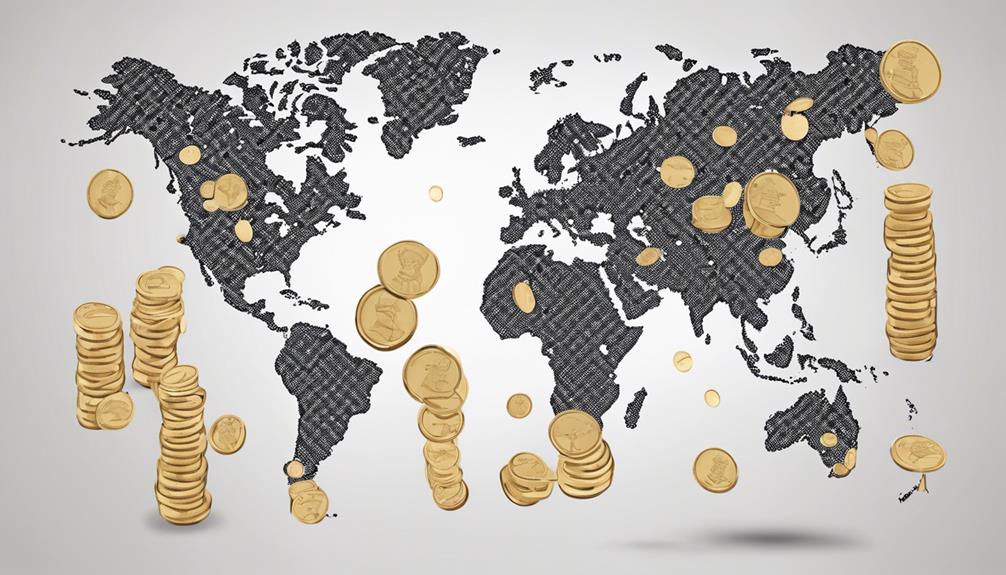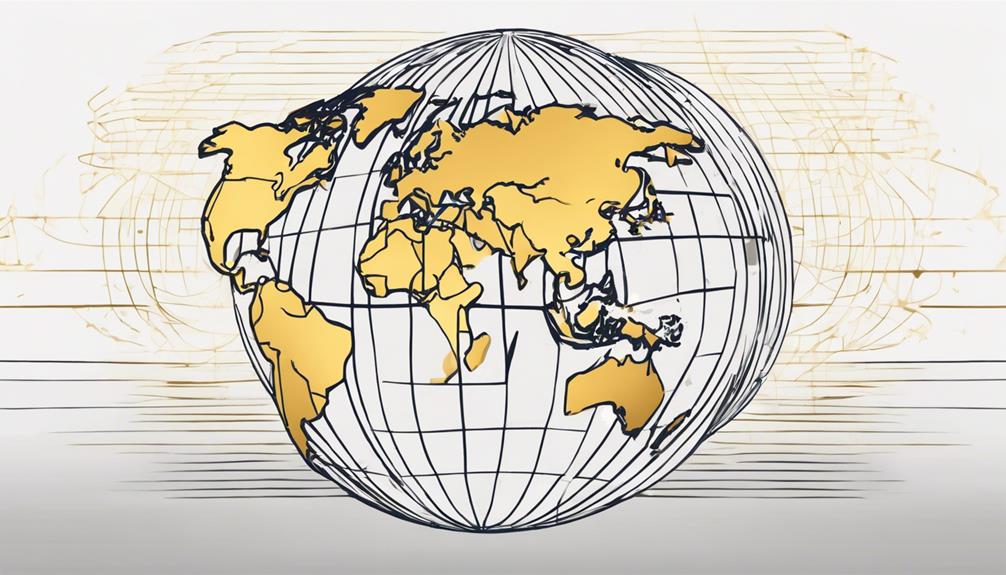The economic disparities observed among countries raise intriguing questions about the underlying mechanisms driving such variations in wealth accumulation. Factors such as governance structures, resource endowments, technological advancements, and societal norms all play pivotal roles in shaping a nation's financial standing. By dissecting these intricate interplays and examining the dynamic interconnections at play, a deeper understanding of the root causes behind these disparities can be achieved. Joining this exploration could potentially illuminate pathways for fostering more equitable economic landscapes globally.
Key Takeaways
- Total factor productivity (TFP) influences national wealth significantly.
- Strategic government policies drive economic growth and development.
- Efficient management of natural resources impacts economic prosperity.
- Well-developed infrastructure and human capital contribute to economic wealth.
Economic Disparities Among Nations

Economic disparities among nations persist as a prominent issue in global economics, highlighting significant variations in wealth distribution and development levels across different countries. Total factor productivity (TFP) and international trade play pivotal roles in shaping these discrepancies. TFP, a measure of efficiency in transforming inputs into outputs, influences a country's GDP levels significantly. Countries with higher TFP tend to have more efficient production processes, leading to increased economic output and, consequently, higher GDP levels. Conversely, nations with lower TFP face challenges in maximizing their production efficiency, resulting in lower GDP figures.
International trade further exacerbates economic gaps between nations. Trade barriers can hinder the flow of goods and services, limiting a country's ability to capitalize on comparative advantages and participate fully in the global market. Consequently, countries with fewer trade restrictions may experience higher economic growth rates and increased wealth accumulation compared to those facing significant trade barriers. Understanding the impact of TFP and international trade on economic development is crucial for addressing and mitigating disparities among nations.
Factors Influencing National Wealth
The disparities in wealth distribution among nations can be attributed to a combination of factors, including free trade, increased investment, favorable climatic conditions, good health, and high levels of education. To delve deeper into the complexities of national wealth discrepancies, it is crucial to consider the following key points:
- Historical data indicates a substantial gap between rich and poor countries, with rich nations being significantly wealthier by 2000-2010, highlighting stark differences in real GDP per capita.
- Physical capital (equipment and structures) and human capital (education and training) inputs account for around 40-50% of the income variations observed across different countries.
- Total factor productivity (TFP), which signifies the efficiency of converting inputs into output, plays a pivotal role in elucidating disparities in economic development.
- Reduction of trade barriers emerges as a vital strategy to mitigate economic gaps between nations and enhance the efficiency of input-output transformation processes.
Understanding these factors is essential in comprehending the intricate dynamics that influence national wealth and economic prosperity.
Role of Government Policies

In shaping a nation's economic trajectory and fostering sustainable development, government policies wield substantial influence. Strategic interventions by governments can significantly impact economic growth and industrialization. Policies that promote strong property rights, free markets, and the rule of law create an environment that incentivizes production and innovation, ultimately leading to economic prosperity. Examples from countries like South Korea and China demonstrate how government support can drive economic transformation. By implementing early changes through effective policies, governments can lay the groundwork for long-term economic growth and poverty reduction.
| Government Policies | Impact on Economic Growth |
|---|---|
| Strategic Interventions | Accelerate economic growth and industrialization |
| Property Rights, Free Markets, Rule of Law | Incentivize production and innovation |
| Government Support | Drives economic transformation |
| Early Changes | Lay foundation for long-term growth and poverty reduction |
Impact of Natural Resources
Countries blessed with abundant natural resources such as oil, minerals, and arable land experience a significant impact on their economic well-being through increased export revenues. The efficient management and utilization of these resources play a crucial role in determining a nation's economic prosperity and overall development trajectory. However, reliance solely on natural resources can expose countries to economic volatility and susceptibility to fluctuations in global market prices.
Resource Abundance Impacts Economy
With the increasing globalization of economies, the impact of resource abundance on a nation's economic trajectory has become a focal point of scholarly and policy discussions. Natural resources play a pivotal role in shaping an economy, but their abundance can lead to both opportunities and challenges. Here are some key points to consider:
- Economic Booms: Countries with abundant natural resources like oil or minerals often experience economic booms due to increased exports and revenues.
- Resource Curse: Resource-rich nations can face the 'resource curse,' where overreliance on resources hinders diversification and long-term growth.
- Management: The effective management of natural resources is crucial for sustainable economic development and avoiding economic volatility.
- Governance and Policies: Implementing effective governance and policies are essential for leveraging natural resources to benefit the economy and society.
Natural Resources Drive Wealth
The impact of natural resources on a nation's economic prosperity is a crucial factor that shapes its wealth and development trajectory. Countries endowed with abundant natural resources often experience higher economic wealth due to resource extraction and exports, influencing their total factor productivity (TFP) positively. However, reliance on natural resources can lead to economic dependence, volatility, and the potential resource curse, impacting long-term economic stability. Sustainable economic development necessitates proper management of natural resources to prevent negative environmental consequences. Nations with diversified economies and efficient resource allocation strategies are better positioned to mitigate risks associated with overreliance on natural resources. Investing in innovation, technology, and human capital alongside natural resources can further enhance economic growth and reduce dependency on resource extraction, fostering overall economic development.
Resource Distribution Influences Development
Natural resources play a pivotal role in shaping a nation's economic development trajectory, with their distribution significantly influencing the overall prosperity and growth potential of a country.
- Rich and poor countries exhibit varying levels of total factor productivity (TFP) influenced by natural resource endowment.
- Resource-rich nations face challenges such as economic volatility, resource curse, and limited economic diversification.
- Effective resource management strategies, transparency, and targeted investments can enhance the developmental impact of natural resources.
- Some countries have effectively utilized natural resources to finance social welfare programs, infrastructure development, and sustainable growth initiatives. Balancing resource extraction with environmental preservation is vital for ensuring sustained prosperity and long-term development outcomes.
Importance of Infrastructure Development
Infrastructure development is a critical determinant of a country's economic performance, as it serves as the backbone for efficient transportation, communication, and energy systems. Well-established infrastructure not only attracts foreign investments but also enhances domestic productivity, ultimately driving economic growth. Advanced infrastructure reduces operational costs, fosters connectivity, and optimizes the delivery of goods and services, contributing to overall competitiveness and a higher standard of living for citizens.
Economic Impact of Infrastructure
Enhancing the infrastructure within a country is a pivotal factor in driving economic growth and fostering efficiency across various sectors such as transportation, communication, and energy. The economic impact of infrastructure development can be summarized as follows:
- Increased Productivity: Well-developed infrastructure improves total factor productivity (TFP) and enhances output per worker.
- Attracting Investments: Improved infrastructure attracts investments, creating job opportunities and stimulating economic activity.
- Global Competitiveness: Countries with robust infrastructure experience higher GDP growth rates and are more competitive in the global market.
- Long-Term Benefits: Infrastructure investments lead to reduced transportation costs, increased trade, and an overall improved quality of life for citizens.
Role in Attracting Investment
Playing a vital role in attracting investments, well-developed infrastructure significantly enhances a country's appeal to potential investors and fosters economic growth. Countries with modern infrastructure, such as efficient transportation networks and reliable communication systems, are more likely to attract foreign direct investment (FDI). This influx of FDI can lead to improvements in total factor productivity (TFP) by creating jobs, increasing efficiency, and driving overall economic development. Investors often prioritize the quality of a country's infrastructure when deciding where to allocate their capital, as it directly impacts the ease of doing business and the potential returns on investment. Therefore, investing in infrastructure projects is crucial for countries seeking to attract foreign investments and stimulate economic growth.
Trade and Globalization Effects

Trade liberalization and globalization have significant impacts on a country's economic growth and development through enhanced market access and increased competition. These effects can be observed through various mechanisms:
- Total Factor Productivity (TFP) Improvement: Trade liberalization enables countries to allocate resources more efficiently, leading to an increase in TFP. By specializing in goods where they have a comparative advantage, countries can enhance their productivity levels.
- Market Expansion: Globalization allows nations to tap into a broader range of markets, facilitating the exchange of goods and services. This expansion can lead to increased economic growth as countries are exposed to new opportunities and demands.
- Innovation and Technological Advancements: Heightened competition resulting from globalization can act as a catalyst for innovation and technological progress in different sectors. Companies strive to stay competitive by developing new products and methods, ultimately driving economic growth.
- Foreign Direct Investment (FDI) Inflow: Access to international markets through trade agreements can attract FDI, injecting capital and expertise into domestic industries. This influx of investment can further stimulate economic development and growth in participating countries.
Influence of Historical Events
Historical events such as colonization have had a lasting impact on the economic structures of nations, influencing factors like resource distribution and trade relationships. Wars have also played a significant role in shaping economic policies and development trajectories, often leading to long-term consequences for a country's wealth. By examining the historical context of these events, we can better understand the disparities in economic prosperity among nations and the lingering effects of past injustices on present-day wealth distribution.
Colonial Legacy Impact
The enduring repercussions of colonial rule persistently shape the contemporary economic landscapes of nations worldwide.
- Economic Disparities: Colonial legacy contributes to wealth gaps between countries.
- Structural Influence: Colonizers often structured economies to benefit their own interests, affecting current economic systems.
- Resource Exploitation: Extraction of resources during colonization can lead to long-term economic challenges.
- Institutional Impact: Inherited institutions and governance structures from colonial times can hinder economic development.
These factors highlight how the historical events of colonization continue to influence the economic status and opportunities of nations today, emphasizing the importance of understanding colonial legacies in addressing current economic disparities.
War and Economics
Wars hold a profound impact on the economic trajectories of nations, shaping their financial stability and developmental prospects. The economic devastation caused by wars can have lasting effects on a country's resources, infrastructure, and overall wealth generation. War-related expenditures often strain a nation's finances, diverting funds away from essential social programs and hindering long-term economic growth. Countries that have endured prolonged conflicts may struggle to rebuild their economies and attract investments, further exacerbating their financial challenges. The repercussions of wars on a nation's economy can create significant obstacles to prosperity, leaving a legacy of economic instability that can persist for generations.
| War and Economics | ||
|---|---|---|
| Impact on financial stability | Hindrance to long-term growth | Struggle in attracting investments |
| Economic devastation | Resource depletion | Infrastructure damage |
Innovation and Technological Advancements

In today's global economy, the pivotal role of innovation and technological advancements in driving economic growth and fostering wealth creation among nations cannot be overstated. When considering the relationship between innovation, technology, and economic prosperity, several key points emerge:
- Total Factor Productivity (TFP): Innovation and technological advancements significantly contribute to TFP, which measures the efficiency at which inputs are utilized in the production process. Higher TFP is associated with increased economic output and improved standards of living.
- Competitive Advantages: Countries that prioritize research and development often experience higher levels of innovation, leading to competitive advantages in global markets. This can result in increased export opportunities and economic growth.
- Productivity and Efficiency: Technological advancements can boost productivity and efficiency, leading to higher GDP per capita. This increase in output per person can positively impact the standard of living within a country.
- Adaptability and Sustainability: Investments in innovation and technology help countries adapt to changing market demands, fostering sustainable economic development and prosperity. Embracing new technologies can enhance economic resilience and long-term growth prospects.
Education and Human Capital
Investments in human capital through education are fundamental to a nation's economic development and prosperity. Countries that prioritize education tend to have a more skilled and productive workforce, which translates into greater economic wealth. Human capital, encompassing knowledge, skills, and abilities acquired through education and experience, plays a crucial role in driving a country's economic success. By investing in education, nations can reap long-term benefits such as enhanced innovation, productivity, and overall economic growth. Access to quality education not only equips individuals with the necessary skills for the workforce but also has the potential to reduce income inequality and contribute to a more resilient economy over time. Moreover, improving educational opportunities for all citizens can lead to a more competitive and prosperous nation by fostering a knowledgeable and adaptable workforce. Therefore, nurturing human capital through education is key to building a sustainable and thriving economy.
Income Inequality and Distribution

The prevalence of income inequality and its distribution across various socioeconomic groups poses a significant challenge to global economic stability and social cohesion. This issue is highlighted by statistics that show the richest 1% of the world's population holding over 50% of the total global wealth, while the top 26 billionaires own as much wealth as the poorest half of the global population. In countries like the United States, where the top 1% of households own more wealth than the bottom 90% combined, income disparities are stark. The Gini coefficient, a measure of income inequality, ranges between 0 (perfect equality) and 1 (perfect inequality), with countries such as South Africa and Brazil exhibiting high Gini coefficients. Addressing income inequality necessitates policy interventions like progressive taxation, social welfare programs, and ensuring equitable access to education and healthcare. Strategies to improve total factor productivity (TFP) can also play a crucial role in mitigating income inequality and fostering more balanced wealth distribution.
Cultural and Social Factors
Cultural and social factors significantly impact a country's economic prosperity and financial success. Attitudes towards work and wealth accumulation, as well as social norms related to entrepreneurship, risk-taking, and innovation, are crucial determinants of a nation's total factor productivity (TFP). When societies value hard work, ambition, and innovation, they tend to experience higher levels of economic growth and development. Moreover, the presence of strong social networks and supportive communities can create favorable conditions for economic opportunities to flourish.
Additionally, a culture that places a strong emphasis on education, skills development, and knowledge sharing is likely to see improvements in its TFP. By investing in human capital and fostering a culture of continuous learning, countries can enhance their productivity levels and overall economic performance. Social structures that promote cooperation, trust, and collaboration also play a significant role in driving economic advancement within a society. When individuals and businesses can rely on each other and work together effectively, it leads to increased efficiency and innovation, ultimately contributing to economic growth.
Future Outlook for Economic Disparities

Societies that exhibit disparities in economic development often face challenges in addressing the future outlook for bridging these gaps, especially in the context of global trade dynamics and evolving total factor productivity trends. When considering the future of economic disparities, several key factors come into play:
- Total Factor Productivity (TFP): Understanding and enhancing TFP can significantly impact narrowing income differences among nations.
- Trade Policies: International trade policies play a crucial role in either exacerbating or alleviating income gaps between countries.
- Research Focus: Ongoing research focuses on the relationship between trade dynamics and income inequality to inform future policy decisions.
- Economic Collaboration: Collaboration among economists globally is essential for devising strategies to reduce economic disparities on a worldwide scale.
Frequently Asked Questions
Why Are Some Countries Richer Than Others?
Countries exhibit varying levels of wealth due to a complex interplay of factors. Economic disparities stem from differences in resource endowments, institutional quality, technological advancements, and historical legacies. These factors influence a nation's productivity, trade relations, and overall economic performance. Understanding the nuances of economic inequality is crucial in addressing global wealth disparities and fostering sustainable development initiatives to bridge the gap between affluent and impoverished nations.
Why Do Some Countries Have a Higher GDP Than Others?
Economic disparities among nations are influenced by various factors, including resource allocation and government policies. Global factors such as trade agreements and technological advancements also contribute to differences in GDP levels. Understanding the complex interplay of these elements is crucial for comprehending why some countries exhibit higher GDP figures than others. Analyzing these dynamics aids in formulating strategies to address income inequalities on a global scale.
Why Are Small Countries so Rich?
Small countries like Luxembourg, Singapore, and Qatar are affluent due to astute economic policies and efficient resource allocation. Their wealth is a result of strategic planning, diversified economies, and favorable tax regimes. These nations leverage their unique strengths such as advanced technology adoption, skilled workforce, and abundant natural resources to drive economic growth and prosperity. Their success demonstrates how effective management of resources and innovative economic policies can lead to significant wealth accumulation.
Why Do Some Countries Have High Income?
Economic growth and income inequality in countries are often influenced by a complex interplay of factors such as total factor productivity, trade policies, human capital, and physical capital. The presence of strong property rights, free markets, and efficient production processes can lead to higher incomes. Conversely, barriers to international trade and inefficiencies in resource allocation can contribute to income disparities. Understanding these dynamics is crucial for addressing economic inequalities and fostering global collaboration for sustainable development.
Conclusion
In conclusion, the intricate web of factors influencing national wealth symbolizes the complexity of economic disparities among nations. By understanding the role of government policies, natural resources, infrastructure development, education, income inequality, and cultural influences, countries can work towards narrowing the wealth gap. Addressing these factors strategically and collaboratively will be crucial in shaping the future outlook for global economic disparities and fostering a more equitable distribution of wealth.
